by Lionel Birnie
Monday
‘Pasta doping’
My alarm went off at 5.15 after a night interrupted by faulty electrics in the bathroom of my Tirana airport hotel room. Every 10 minutes or so, the light and the air-conditioning came on. The touchscreen ‘smart’ controls were no use. No matter what I pressed I couldn’t stop it coming on so in the end I rolled up one of the big bathroom towels to block the light at the bottom of the door, rolled over and tried to tune out the irritating humming sound.
After the very short hop across the Adriatic, we picked up our hire car and headed into Bari on the trail of a potential scandal. ‘Pasta doping’. Bari has become famous for one narrow street where old ladies sit at tables making orecchiette, little ear-shaped pasta, by hand. They sit there all day, rolling the dough into long strands, cutting them with a knife and then flattening, rolling and pinching them into shape. They work quickly, putting the finished shapes on large trays to dry in the afternoon warmth.
As we walked the length of the street, groups of tourists arrived to observe this traditional spectacle, marvelling at the ladies’ skill and queuing up to buy bags of their pasta.
Except… there’s a suspicion that the bags on sale are not filled with lovingly-made bespoke orecchiette, handcrafted by individual artisans, but factory-made, industrial quantities of uniform pasta bought from the wholesalers and repackaged.
As Lance Armstrong said, extraordinary accusations require extraordinary proof, so we headed in search of the truth in ‘orecchiette alley’.
Queen of the Orecchiette is a woman called Nunzia Caputo, who has her own brand of pasta with a picture on the packaging of her smiling like a wholesome pasta nonna. Nunzia also seemed to have a henchman, or watcher, keeping an eye on the crowd, looking out for trouble. This is because Antonio Locante, a local journalist, has been on the trail of the Pasta Nonnas, stirring up trouble as they see it, searching for evidence that the whole thing is a charade.
As Daniel approached the table hoping to have a word with Nunzia, holding his audio recorder low down, out of sight, I noticed The Watcher’s gaze narrow. To head off any suspicion he was digging for dirt, and to avoid conflict, Daniel bought a packet of pasta for five euros.
Antonio’s contention is based on the fact he has found packaging from mass-produced pasta in bins round the back of the alley. Whenever he shows up it causes a kerfuffle because clearly the Pasta Nonnas and their watchmen are not happy with being accused of cheating. I’m struck by the parallels with the doping scandals in the 1990s and 2000s – a journalist making it his life’s work to expose the wrongdoing; searching through bins for packaging and other evidence.
The authorities in Bari are in a tricky position. The Pasta Nonnas have become one of the city’s main tourism draws. On the other hand, the old women are barely paying lip-service to food safety rules, working without gloves, outdoors where brick dust from nearby renovation work wafts in the air. There’s also an investigation into whether the Pasta Nonnas are paying tax – all the purchases seemed to be in cash, there were no tills, no receipts, no way of tracking who’s paying what, but let’s give them the benefit of the doubt and assume their record-keeping behind the scenes is impeccable.
We get back to the car with Daniel’s bag of orecchiette and I have to say they do look much more uniform in size and shape than the ones being made by hand. Case closed?
After checking in to our delightful, remote rest day hideaway in Locorotondo we head into town for lunch and find a simple cafeteria serving an array of lovely things on paper plates with plastic cutlery. The crockery was a red herring because the food is great. I go for the lentils with tiny pasta and a side salad featuring ricotta, roasted peppers and aubergine, and lightly pickled beetroot slices. Dinner is equally good – orecchiette, naturally, plays a prominent role. Then it’s back to our hillside hideaway where my room is tucked under a trullo, the conical-shaped roof above my head means a nice high ceiling and there’s actual light switches with not a ‘smart’ touchscreen to be seen.
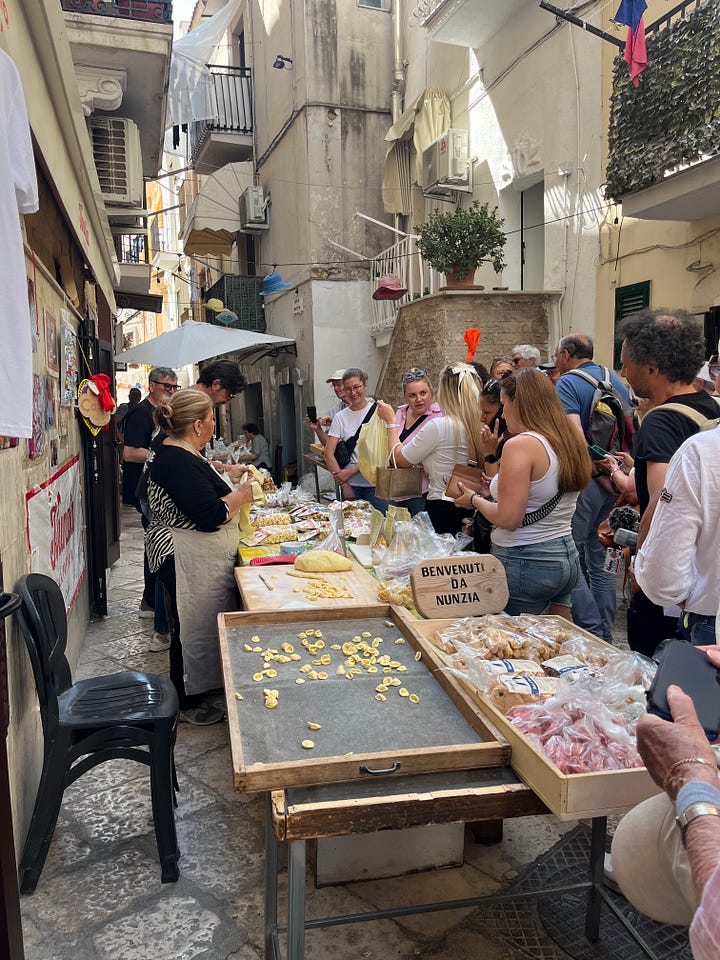
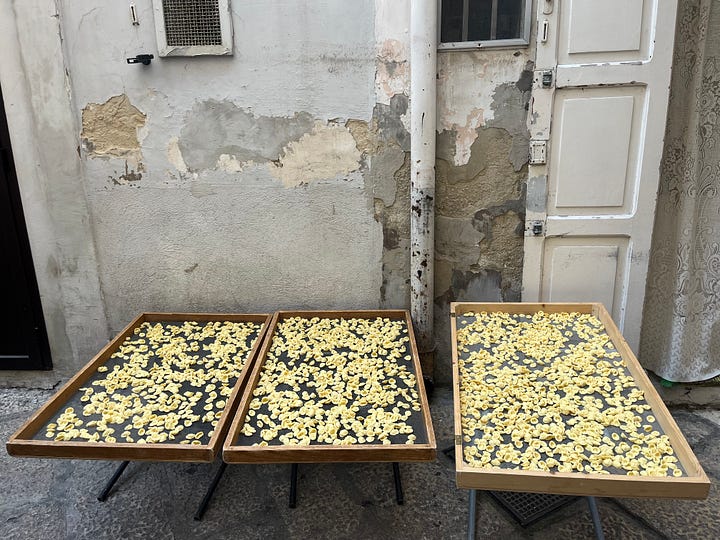

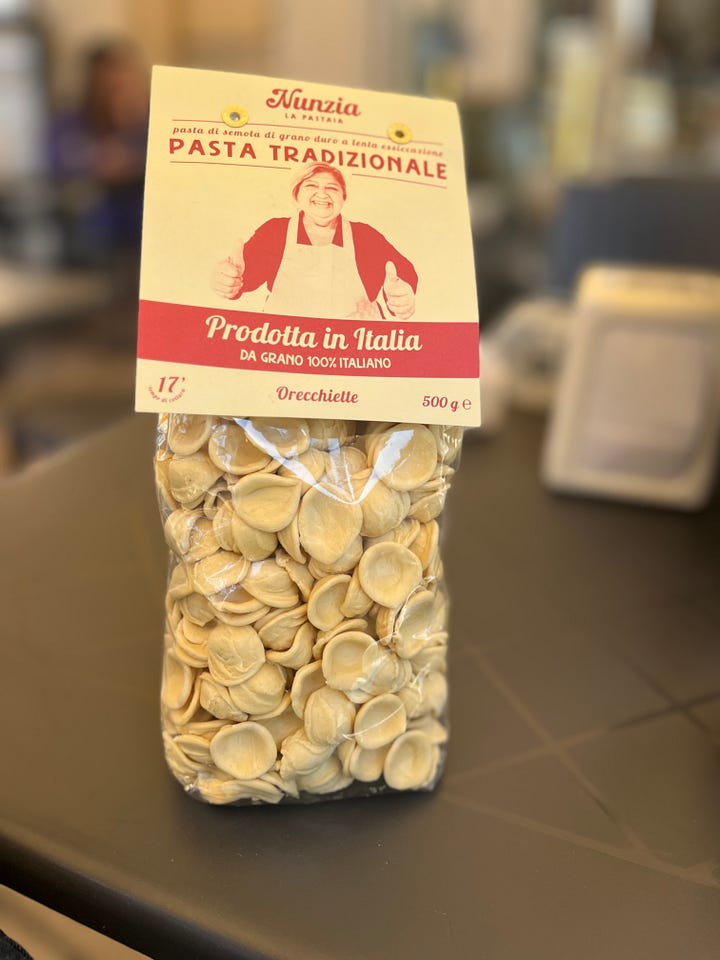
Tuesday
Trulli, Madly, Deeply
The last time I was in Alberobello was in 2017, when Caleb Ewan won the stage, and I was keen to get back to see the trulli, the charming conical houses that give the impression of a brick-work campsite stretching all the way to the hills.
This style of building is dotted all over this part of Puglia but Alberobello is the capital city of trulli and it is delightfully photogenic from every angle. The story goes that the houses were popular way back when property taxes were high. The conical houses were constructed without mortar, similar to a drystone wall. The gaps between the bricks were large enough for ventilation, and to keep the inside cool in summer, but tight enough not to let in the rain. But, crucially, the houses could be dismantled in a hurry if the taxman was in the area. Unable to tax a pile of bricks, they’d ride on. Presumably the residents would plead innocence before rebuilding their little brick tents again once the taxman was out of sight. As Daniel said, skullduggery and tax evasion in Italy? Never!
I head to the team buses where I speak to Matt Winston, race coach at Team Picnic-PostNL, about a number of things, but not the crucial thing, it turns out. Firstly, Max Poole’s ideal start to the Giro d’Italia and whether it marks the next stage of his development into a general classification rider. Poole was one of the most aggressive riders at last year’s Vuelta a España, getting in a number of big breaks but falling just short of a stage win a handful of times. This is also Romain Bardet’s final grand tour before retirement, which is scheduled for after the Critérium du Dauphiné next month. I also asked Winston about the relegation scrap. Team Picnic-PostNL is in the thick of a battle to stay in the World Tour. The one thing I didn’t ask about was their young Dutch sprinter Casper van Uden and his prospects of winning the stage to Lecce. Towards the end of our conversation Winston referred to the possibility of collecting three stage wins in this Giro. As I walked back to the car, I looked at their roster and could, at a push, see where a couple might come from (Poole and Bardet, perhaps) but not a third. Shows what I know.
When we arrive in Lecce and walk to the Sala Stampa (press room) my ears prick up at the sound of something familiar. We are in Puglia, the heartland of the pizzica folk music played by Amaraterra, who have provided our Giro theme music since 2016 and one of the songs they do is being played through the speakers near the finish line. ‘Amaraterra play it better,’ I say.
Van Uden wins the stage. At the finish line, Bardet asks Daniel who won and Daniel doesn’t know. ‘One of your guys,’ he says. Bardet seems surprised too, so perhaps it’s not just me under-estimating the young man’s talent. Van Uden won the Rund um Köln ahead of Biniam Girmay and a stage of the Alula Tour ahead of Dylan Groenewegen last year, so he’s clearly fast but it was nevertheless an unexpected win.
Our masseria is stunning. A big place with shady courtyards, a swimming pool and rooms bigger than some apartments. There’s also a friendly little cat the colour of Alpecin-Deceunink’s grey jerseys. It tickles me later to find out the cat hissed at Daniel. Dinner was again excellent – I opted for an antipasto of dried ham, which had been crinkled into flower-shapes, its petals guarding a lightly minted cheese filling. Afterwards I opted for the tuna tataki, which was equally good – great quality fish, well-seared by beautifully rare in the middle, rolled in sesame seeds.
I was woken in the morning by gentle meowing outside my door.
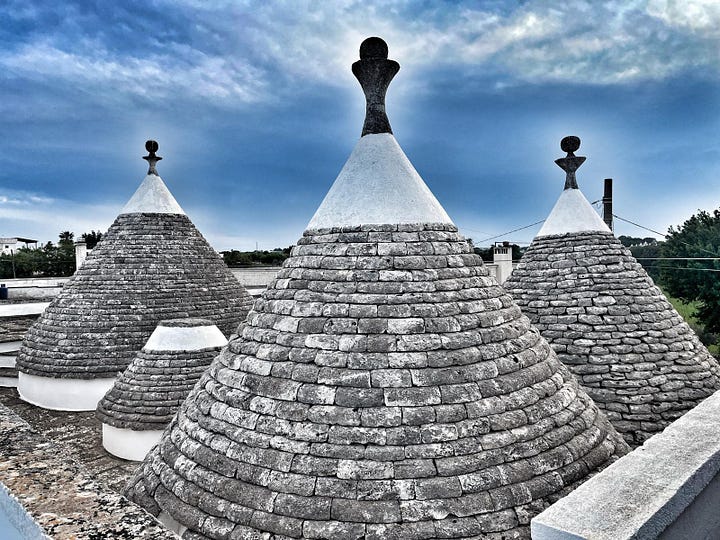

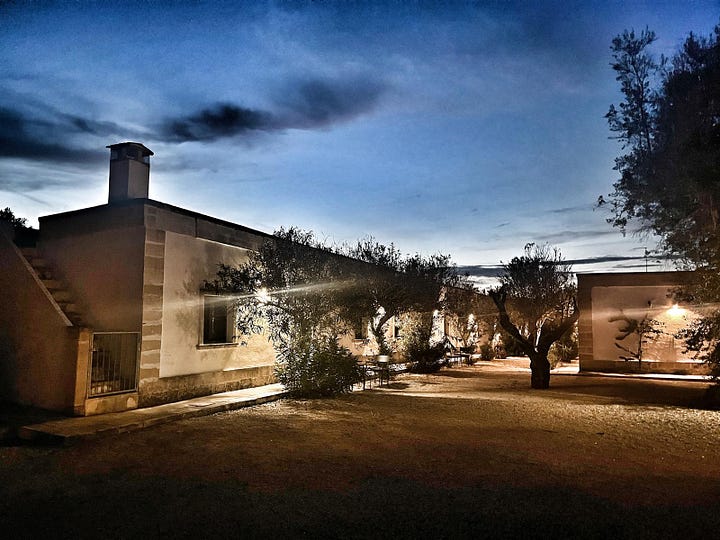
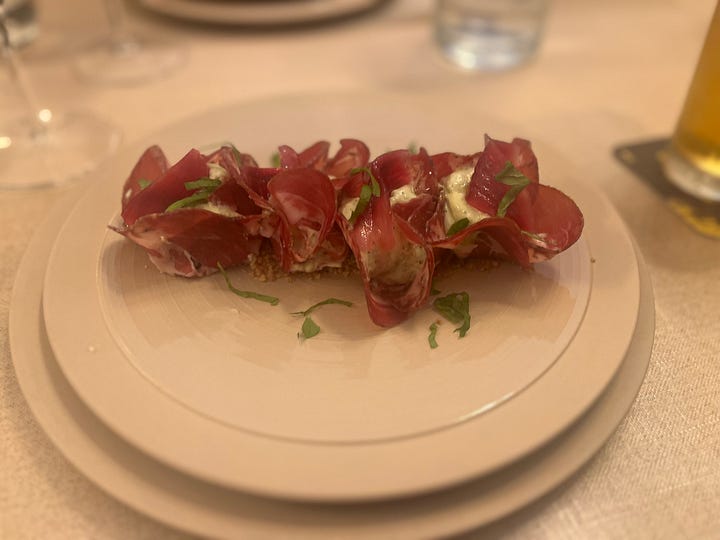
Wednesday
Majestic Matera
The start in Ceglie Messapica sounds like it’ll be a delightful little town but the Giro entourage has been stuck out on the outskirts of town where there’s not even a cafe to while away half an hour or so before the team buses arrive.
I headed to Picnic-PostNL to speak to Matt Winston again, partly to correct yesterday’s omission and ask about Casper van Uden. I’ve always been impressed by the team’s steadfast determination to do things slightly differently, dating back to the Sunweb days, sticking to the plan even when results don’t necessarily follow. The mantra of following the process, taking it day-by-day, debriefing and learning from what went wrong as well as what went right, can start to sound like one of those weary grand tour clichés, but when Winston explained that Van Uden and his lead-out riders had honed their skills together at the Tour of Turkey last month as part of a longer journey towards this Giro it was impossible not to admire their resolve and feel happy for them that it had paid off.
Then I went to the Lidl-Trek bus to find out from their sports director Maxime Montfort how they rate Giulio Ciccone’s overall chances. Noting Ciccone’s commitment to Mads Pedersen during the opening stage in Albania I made the rash comment that the Italian was an outsider for the podium, perhaps slightly giddy with early grand tour excitement and recency bias based on his ride at Liège-Bastogne-Liège. Daniel pointed out that Ciccone has never made the top ten of a grand tour. ‘He was 11th in last year’s Tour de France…’ I said, before Daniel crushed my suggestion like a bug. ‘Hasn’t finished in the top 10, that’s a fact.’
My counter-point to that would be how good he looked at Liège-Bastogne-Liège when he was second and the most aggressive rider, bar Pogačar. If any one-day race is an indicator of grand tour potential, it’s La Doyenne.
Montfort confirmed that the team have very high hopes for Ciccone. I was silently urging him to state that the final podium in Rome was the goal but he didn’t go quite that high. Top five, was Montfort’s assessment of his ceiling. Well, top five makes a rider an outsider for the podium, as far as I’m concerned. An old colleague from my magazine days, Edward Pickering, sent me a message to point out that Ciccone’s initials are GC so surely that’s a sign. If nothing else happens in this Giro, I hope Ciccone finishes third and I can make a booking for Daniel at a restaurant serving humble pie during the final weekend.
We make our way to Matera, a town I am really looking forward to seeing. It featured in the opening scene of the most recent James Bond film but having failed to make it through more than 10 minutes of any 007 movie – including one I went to the cinema to see – I have seen only clips. The real thing is absolutely spectacular, and its history is fascinating. Known in the 1950s as Italy’s shame because the place was decaying, lacking running water and power, it has been transformed relatively recently.
Daniel and I record outside a bar and just as we get underway it starts to rain. By the end of part one it’s really pouring down and our computers and recording equipment are getting wet so we move further under the umbrella. The rain adds a slightly panicked tone to our coverage.
Afterwards, we head to the car to get our cases and wheel them, in the dark, through deep puddles (it turns out) to our apartment 500 metres away. When I open my case, the bottom side has been drenched and my clothes are wet. Fortunately this is stuff I’ve already worn so I put the damp items in a carrier bag to prevent contamination and get ready for dinner. If I was staying another week, this is the sort of incident that would be a real Giro breaker but I’ve got a couple of fresh, dry t-shirts still intact and my underpants, though not Iuman ones, are indestructible.
It’s still raining, though not as heavily, when we head back towards the ancient city for dinner. Daniel is wearing a brand new pair of trail-running shoes and he slips a couple of times. The third time he slips, right outside our restaurant, he goes down. Fortunately, he’s okay but it’s a hint of what’s to come. ‘I note you didn’t try to help me up,’ he says later.
The restaurant is carved out of the rock and was at one time was a dwelling that was home to at least four families. As we prepare to order, I make a comment about the little face masks on the wall. The look like baby Elvis Presleys, I say. This prompts a near five-minute monologue about the masks from our host. Apparently they are a major feature of a festival that takes place in Matera in July and Daniel got the full rundown. ‘I won’t ask any more questions,’ I say when she’s finally taken our order to the kitchen.
I am still quite full from the excellent press room buffet at the finish where I couldn’t help myself from going back for seconds. (Thirds, I hear Daniel interject). There were a couple of baked pasta dishes, cheeses and hams, a fantastic pureed broad bean and spinach combination, and ciabatta and tomato salad drenched in delicious olive oil. So I opt for what I hope will be a light plate of cheese followed by bavette, flattish spaghetti made with red wine, mixed with a sauce made of salt, pepper and a lightly-smoked cheese, all topped with pistachio nuts.
After dinner, our host offers us a liqueur. A little limoncello, or even a grappa, can sometimes be a lovely way to round off a meal but this dark brown liquid, apparently made from nuts, tastes like furniture polish. I manage to force half of the little glass down but both Daniel and I pour the rest into our empty wine bottle when our host is not looking.
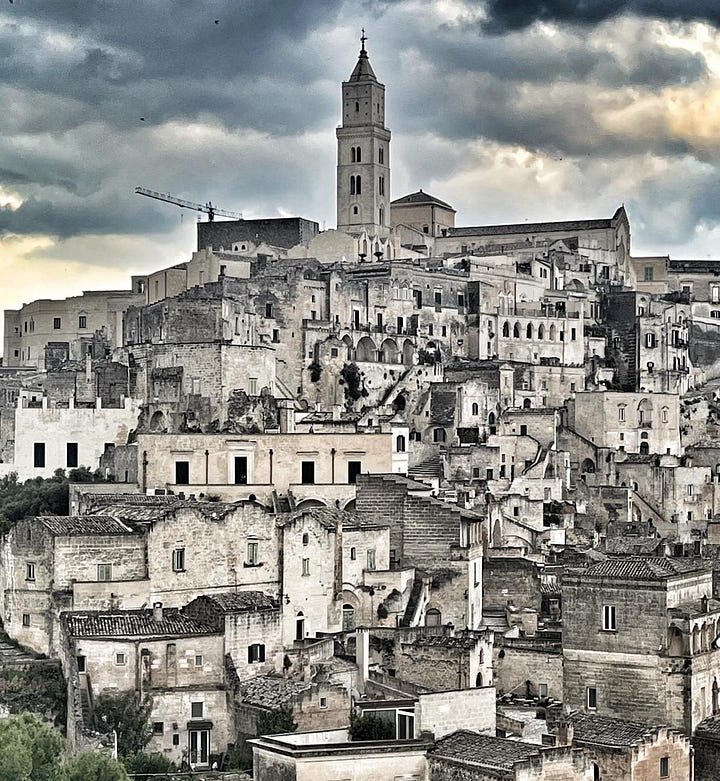
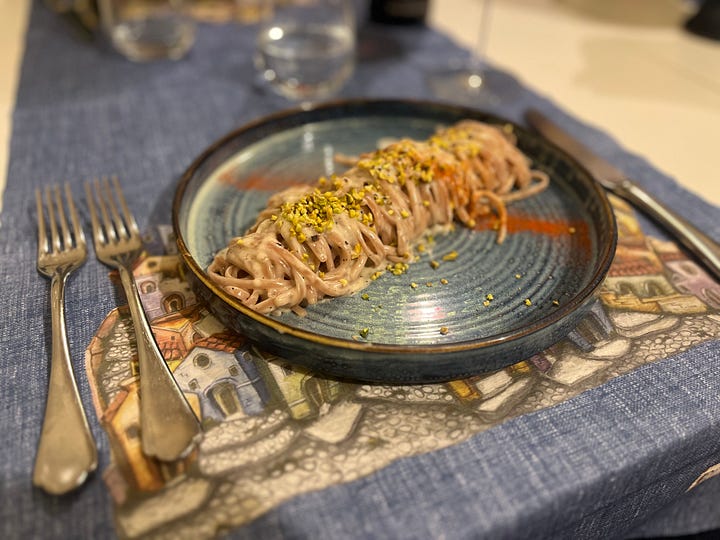

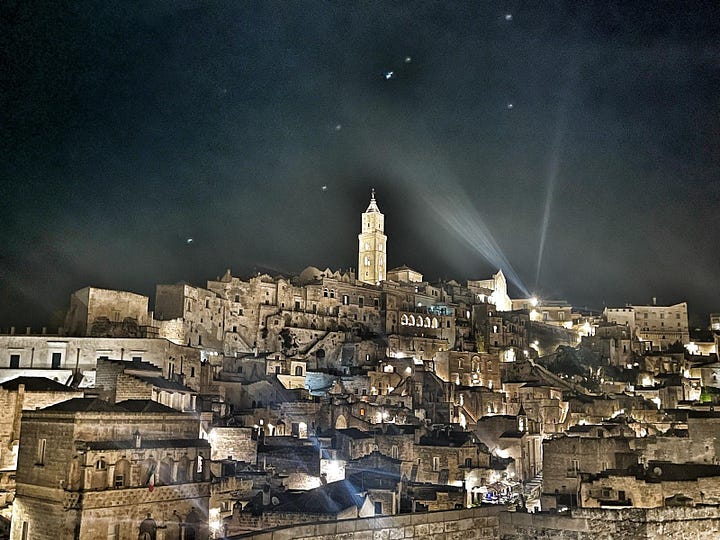
Thursday
Grande Casino in Napoli
At the start in Potenza, I see Max Sciandri, sports director for the Movistar team. I’ve known him a long time, since his racing days with Française des Jeux in the late 1990s, through his short spell at the Linda McCartney team (when he was a great source of gossip and quotes regarding the team’s difficulties and disfunction), through to his time with the British Cycling academy. He’s always happy to chat and he’s got something interesting, or funny, to say about almost any subject. We’ve featured him in episodes of Kilometre 0 talking about Italian food, il Garibaldi (the Giro’s race handbook), and he was the subject of The Supertuscan an episode during Our Giro, the lockdown Giro d’Italia in May 2020.
Today is the longest stage of the Giro and, with an additional 10 kilometres in the neutralised zone, the riders will do almost 240 kilometres today. I start by asking Max whether long stages like this should be a thing of the past. Max talked about the differences between racing in his day – he first rode the Giro in 1990 – and today. I will play the whole conversation here so you can listen.
Many retired riders, and sports directors, think the sport is more serious, less fun, than it was in their day but listening to Max talk about not just the speed of the racing but the intensity, the overload of data that tracks power, heart-rate, calorie intake and carbohydrate consumption, even quality of sleep, sometimes leads to the impression that there are fewer and fewer unknowns. Even the unpredictable is slightly expected.
I head back down the hill to the bakery Max recommended for a custard-filled croissant and a cappuccino (well, it was 11.30) and to wait for Daniel.
Brian will be joining us in Napoli later and I know that, after the stage, he and Daniel will be heading an hour-and-a-half north to some fancy winery. Not wanting to delay them further by asking them to fight through the traffic to drop me at my hotel near the airport, I look at the race route and Google Maps and work out that we should be able to drop my suitcase off on our way into the city. That will save me having to lug it around in the search for a taxi after the stage. It should work out well for all of us.
Unfortunately, it turns out to be a flawed plan. Deviating from the approved off-race route to the finish means we leave the Giro ‘bubble’ and can’t find our way back in. Napoli is a mess, in more ways than one. The concrete legs holding up the motorway look on the verge of collapse. There are craters and cracks in the road. Everything is dirty and strewn with rubbish.
Daniel pleads with a police officer to let us through the barriers onto the course because there’s still plenty of time before the Giro E and the publicity caravan come through but he’s adamant. ‘Go a bit further up and ask them,’ says the officer. The Groupama-FDJ bus was in the same position half an hour ago and they refused to let it through either, he says.
We go round in a loop to the port. Tantalisingly, we can see where we’re supposed to be, but we can’t get there. We spot the Polti-Visit Malta team bus also in the wrong place. I consider suggesting we ditch the car and walk the three kilometres to the finish but it feels like there has to be a better way so we drive back out of the city, one motorway junction north, in the hope we can cut back in and get to the press room. But it’s gridlock. We creep forward perhaps 500 metres in two hours.
The car goes silent, save for the occasional sigh from Daniel.
In the race, there’s been a big crash on roads made incredibly slippery by the rain. Mads Pedersen, the maglia rosa, went down but is okay. The 2022 Giro winner, Jai Hindley, is not so lucky and has to pull out of the race, depriving Primož Roglič of a vital teammate. There’s a rumour Jay Vine has also pulled out but that turns out not to be the case.
The race is neutralised immediately. The GC times are frozen, and the points for the ciclamino jersey are cancelled. Apart from the stage win, the day is effectively a write-off. Taco Van der Hoorn and Enzo Paleni have been out in front for well over 200 kilometres and they are caught close to the finish, although it’s a false sort of drama because they were never going to stay away.
Kaden Groves wins the sprint but the whole day has a feeling of pointless anti-climax. Two of the three most recent finishes in Napoli have been at the weekend but trying to take the race into one of the busiest and most chaotic cities in Italy in a straight line on a weekday afternoon seems foolhardy. It perhaps explains why the police officer we encountered was so adamant. Usually there’d be a bit of room to negotiate with the police but with tens of thousands of cars, traffic jams and increasingly fraying tempers (and not just in The Cycling Podcar) the priority was just to keep the public off the course, cross fingers and hope it all went okay.
The crash and the subsequent neutralisation was bad for the race, but the right decision. The worst case scenario would have been riders going down like skittles in the finish straight. To plan a stage that hinged on the weather being dry was always a risk. People watching at home on TV might wonder why the riders can’t modify their riding to the conditions but the fact is, as Max Sciandri said, the racing is so intense now there’s no way to back off. The bikes are set up for speed, the gears are bigger than ever, and a sprint finish requires full commitment.
Brian saved our skin. He interviewed Lidl-Trek sports director Kim Andersen and his EF Education First counterpart Matti Breschel, and got the reaction of Giro director Mauro Vegni.
We recorded in a little bar on a busy street corner. The woman working behind the bar cursed the Giro’s arrival saying she had to walk almost 10 kilometres to get to work because of the traffic and the road closures.
It’s not the first time I’ve missed a stage – back in 2014, after the grand départ in Yorkshire, an electrical fault on the Channel Tunnel meant Richard and I had to watch the finish on TV in a bar in Calais – but it was a downbeat end to my brief Giro stint. For Daniel, it was a rare blot on his streak of 28 consecutive grand tours which stretches back to 2016, so I am sorry for that.
All that’s left from me for now is to say is ‘Vai Giulio’ and good luck to Daniel and Brian.





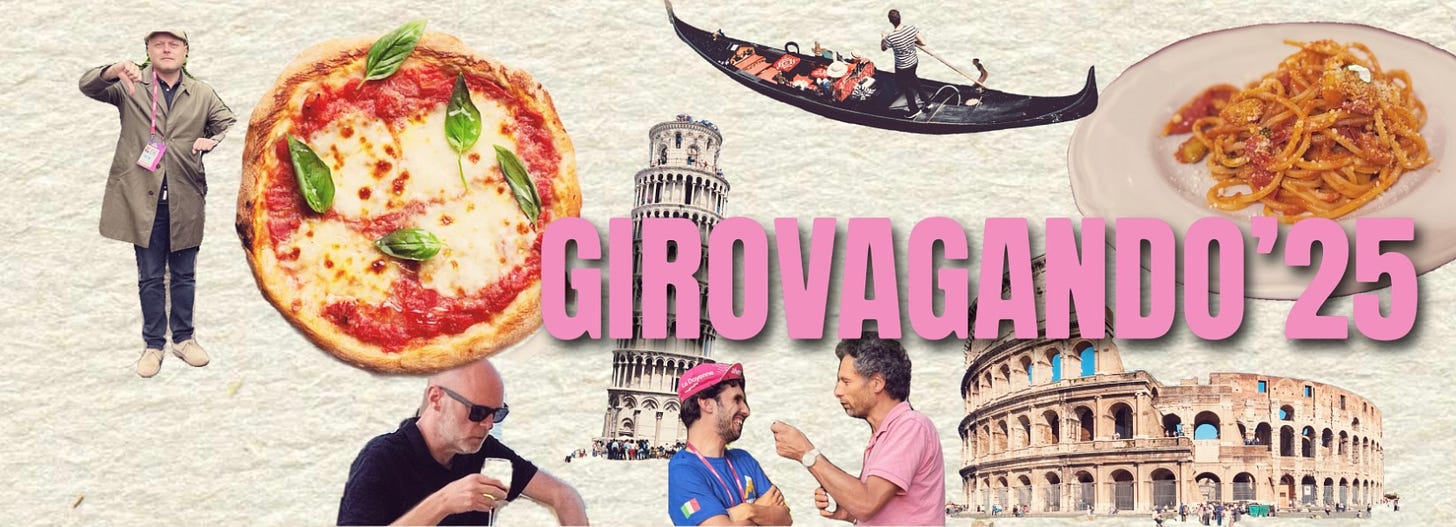
Thanks Lionel, I hope to hear from you more often! Also, I really hope that we get to experience a Derek Gee-jingle from Daniel once again. Cheers
As always, it's been a joy to travel vicariously through the first week of the Giro along with you and Daniel. Thank you Lionel.